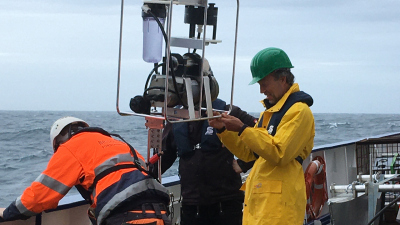- Home
- Discover
- Archive News
- News 2021
- FACTS Microplastic
Research cruise explores microplastics

The cruise is realized within the framework of the FACTS project. During the expedition, the pathways and fate of microplastics in northern European waters, especially in the northern North Sea and the eastern Atlantic Ocean, will be investigated. More than 50 scientists from 16 institutes from a total of seven countries are working together on the project. The focus is on the transport of microplastics by currents up to the Barents Sea and the transport through the water column down to the ocean floor and possible storage in sediments.
From the Cluster of Excellence "The Ocean Floor - uncharted interface of the Earth" based at MARUM, Prof. Karin Zonneveld and Dr. Gerard Versteegh (now AWI) from the RECEIVER Research Unit are involved. They collect in-situ microplastic particles from selected water depths to study the transport of these particles at the water surface and through the water column to the deep ocean. They are also collecting seafloor sediments and investigating the extent to which plastic particles have already been deposited. To avoid contamination during the closer examination of the sediment cores, a coring device made of stainless steel was constructed at MARUM specifically for this purpose.


